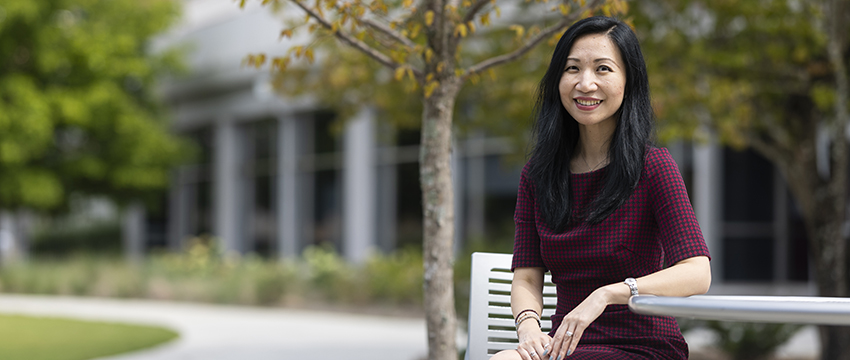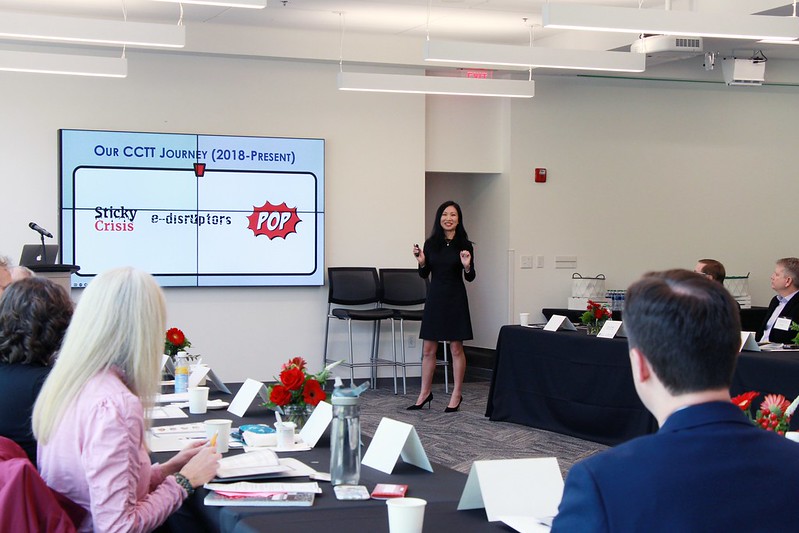Yan Jin builds crisis readiness

Yan Jin builds crisis readiness
Yan Jin lives in a world of crisis communication, but that doesn’t mean she is ever in crisis.
Instead, Jin teaches crisis communication classes at Grady College of Journalism and Mass Communication, she directs the Crisis Communication Think Tank bringing industry experts and scholars together in thought leadership co-creation and advancement, and she holds title of C. Richard Yarbrough Professor in Crisis Communication Leadership.
“On a personal level, I don’t like crisis or conflict,” Jin says, somewhat ironically.
Jin recognizes that many crises would not escalate if there was better communication, so she seizes her opportunity to teach students how to manage difficult situations and learn from previous experience. She teaches Grady College undergraduate students in her Crisis Communication course and graduate students in her Mass Communication Theory course.
“I am always asking ‘what can we understand better to make communication more effective, more ethical, and how can we help organizations learn from their experience in order to not just protect their reputation, but more importantly, protect the health and safety of their people?’”
Collaborating with others and sharing research is a hallmark Jin brings to widespread academic and corporate communities, as well. In addition to serving as associate director of the Center for Health & Risk Communication, Jin’s dedication to the Crisis Communication Think Tank (CCTT) brings scholars and industry executives together to have conversations and build bridges. The CCTT is a group she co-founded in 2018 and features an international membership that focuses on global challenges ranging from financial crisis to health disasters and geopolitical issues.
“With the CCTT, we are trying to build something that’s feasible, sustainable, innovative and meaningful for both practitioners and scholars alike,” Jin said. “It’s this spirit of building crisis readiness that we are striving for to advise CEOs and decision-makers. We are providing the theory-driven, evidence-based counsel so the organizations can be prepared from a risk and conflict management perspective, so they can navigate crisis more efficiently.”

Jin is a prolific researcher, having written more than 100 peer-reviewed journal articles and more than 30 book chapters, as well as edited several books about crisis communication, including most recently “Social Media and Crisis Communication” (2nd edition). Jin’s research is frequently cited, including a recent report where she was named a Top 6 Most Published Author in Public Relations Review articles. She is an elected member of the Arthur W. Page Society. In 2019, she received the Kitty O. Locker Outstanding Researcher Award from the Association for Business Communication.
Jin is the faculty advisor of the CCTT-affiliated Crisis Insights & Analytics Lab joined by undergraduate and graduate researchers across different majors at UGA, collaborating with research groups at Penn State University and Northumbria University in the U.K. Sharing her research knowledge and crisis communication expertise with students gives Jin the most satisfaction, whether it is a doctoral student working through a dissertation or an undergraduate researcher tackling a CURO project, like her work with Schwarzman Scholar Elise Karinshak.
“I’m very grateful to UGA for allowing faculty members to collaborate with young scholars to tailor research programs that will make a difference in their future endeavors,” Jin said.
It’s this same spirit of gratitude that motivates Jin in her teaching, as well.
“As a teacher, I want to inspire students to be constantly curious and explore the pathways, following their bliss,” Jin said. “There is nothing more rewarding than watching students fulfill their own pathways.”
Jin acknowledges that while not all her students will become crisis managers, she is teaching the mentality and principles that are applicable to many work and life scenarios.
“We talk about how to stay calm,” Jin said. “It’s important to maintain a sense of humor, take care of your people and be a good human. And, if there is a crisis, keep in mind that beyond every threat, there is always opportunity. No matter what happens, there is an opportunity to learn with curiosity, gratitude and gumption.”